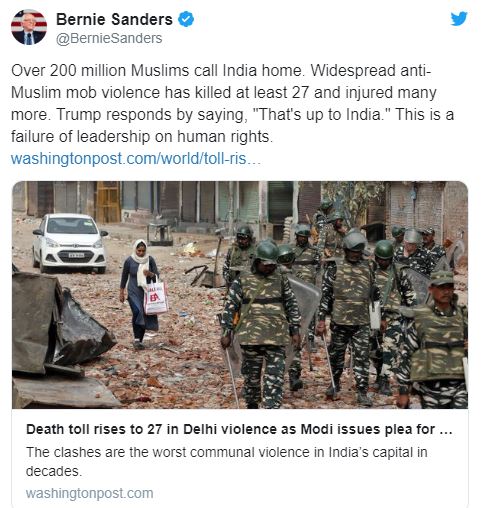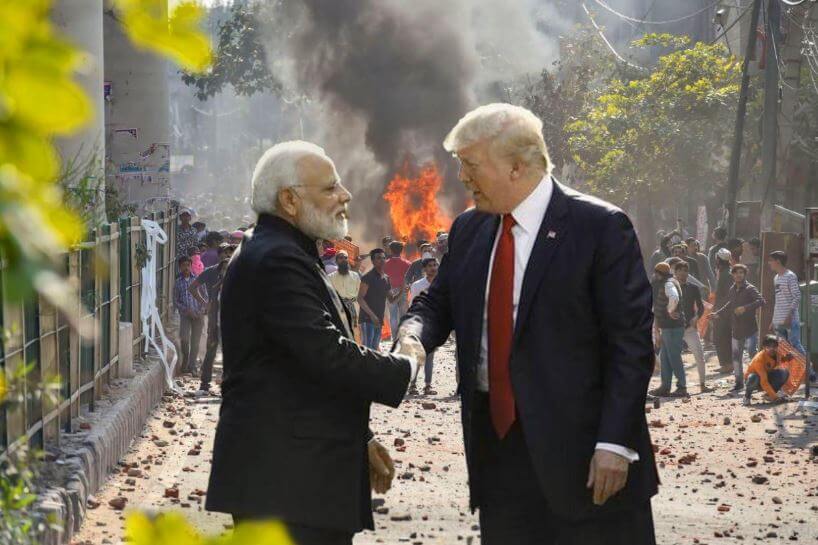In the past year, Prime Minister Narendra Modi’s actions with respect to Kashmir and the controversial Citizenship Amendment Act have come under the international scanner for their apparently discriminatory and Islamophobic underpinnings. Most recently, political leaders from other countries, as well as international organizations, have strongly condemned the brutal communal violence in New Delhi, which occurred in broad daylight during US President Donald Trump’s historical visit to the national capital. But have these incidences created a shift in how foreign powers deal with India?
For decades since India’s independence, world powers–especially in the Global North–have espoused India as the biggest success story of a pluralistic liberal democracy. As opposed to China, India’s billion-plus population is viewed as a thriving market that is open to foreign collaboration and investments. The country’s growing regional influence, both strategically and militarily, has caught the eye of many a world leader. At international forums and bilateral talks, Modi has been able to project his vision for India as an all-round progressive and inclusive one that is devoid of any Hindutva agenda, and this has worked in the country’s favour so far, especially with respect to trade and investments, joint military exercises, and diasporic engagement.
As the world’s 5th largest economy and a neighbour of China, India’s importance in the current international scenario is quite high, especially for the Global North who look at the country as a natural mediator to their discontents with China. India’s continued emphasis on destroying transnational Islamic terrorism and holding Pakistan accountable for its complicity has also impressed many, who now see potential defence partnerships with India to be in their security interests. Hence, even though news of alleged targeted state-sponsored violence and police brutality comes as a shock to Western powers that have fallen to Modi’s charm, they are unlikely to punish India for its illiberal outlook.
This is why, for example, the Trump administration, albeit wary of signing a trade deal with Modi’s government, has continued to push for a stronger defence relationship with India. Trump’s speech at the Motera Stadium was full of positivity and niceties, especially towards Modi, whom he has previously referred to as a ‘tough negotiator’. Even his official statement regarding the violence in New Delhi was one of hope; hope that the Indian administration will ensure religious peace and freedoms for all citizens. This comes despite the fact that the CAA has been rejected and opposed by the US Commission on International Religious Freedom, Congressional Democrats, and even the city of Seattle. But tides may change if Bernie Sanders comes out as a winner for the next election since he has taken a solid stance against the issue and criticized Trump's ambivalence to the violence in New Delhi.

Europe has also taken an uncharacteristically neutral stance on Modi’s questionable treatment of religious minorities. Ugo Astuto, the EU ambassador to India, said that he hoped that the bill was in accordance with the Indian Constitution’s “high standards”. In addition, the EU parliament has deferred its vote on the issue. This, along with the rather elusive visit of mostly far-right EU parliamentarians to Kashmir, at a time when local political leaders and journalists were barred from accessing the region, makes it quite clear that the EU wants to steer clear of any controversy regarding India’s domestic affairs. It is also worth noting that at a time when the very foundations of the EU are trembling–à la Brexit, rising Euroscepticism, the acknowledgment of a changing world order and ‘Westlessness’–it is in the body’s best interest to maintain cordial relations with foreign powers like India.
It is particularly imperative to guage the reaction of Islamic countries to what is being deemed as an anti-Muslim pogrom. The states in the Gulf Cooperation Council have maintained a resounding silence on the issue, which does not seem out of place considering that their diplomatic relations with India have traditionally been guided by principles of non-intervention in state matters. India is also an extremely important trading partner for oil and petroleum, as well as being one of the region’s primary sources of manual labour. However, the Organization of Islamic Cooperation (OIC) has been prompt in criticizing India for the CAA and the New Delhi violence, to which the Ministry of External Affairs has reacted strongly, calling the body’s statement misleading and inaccurate.
But India seems to be heading towards a diplomatic shift over this issue with two countries in particular–Iran and Malaysia. Following the Iranian Foreign Minister’s recent tweet condemning the CAA and the New Delhi violence, India summoned the Iranian ambassador in Delhi and lodged a strong protest over these comments. Simultaneously, the Indian government banned the import of palm oil from Malaysia as a response to its reactions to Kashmir and the CAA, despite the fact that the state has been India’s primary supplier of palmolein and refined palm oil. Such reactions from the Indian government have the potential to drastically affect the trade of these essential items and further sour relations with these countries.
Perhaps the most interesting development so far has been the reaction of the United Nations to the CAA. Most recently, the UN High Commissioner for Human Rights, Michelle Bachelet, moved the Indian Supreme Court to hear a petition claiming that the CAA is fundamentally discriminatory. Bachelet also expressed her concern about police inaction during the New Delhi riots. While the Centre has responded to the petition reiterating that the issue is an internal matter, this move has definitely caught international attention. And while one may debate the relevance of the UN and its rather limited role in mediating in domestic conflicts, changing attitudes towards India may have a detrimental effect on the country’s efforts to gain a coveted permanent UNSC seat.
Lastly, the implications of the CAA in India’s extended neighbourhood within South Asia must be examined. New Delhi’s Neighbourhood First policy aimed at increasing connectivity and trade in the region may not be enough to mitigate the massive insecurity created by the CAA, especially for Bangladesh. Maintaining good ties with Dhaka is essential to the country's Neighbourhood First policy, the Act East policy, and to ensure stability and peace along India’s North-Eastern frontiers. However, while Sheikh Hasina’s government has acknowledged that the CAA and NRC are India’s internal matters, it fears the reverse migration of those that will be expelled once the acts are implemented. To express its dissatisfaction with India’s moves, Bangladesh cancelled the visits of two of its cabinet ministers to the country. As anti-India sentiments grow among the Bangladeshi populace, New Delhi must be wary of losing to China, who is trying to woo Bangladesh as a part of its Belt and Road Initiative.
Pakistan’s reaction to the CAA has been expectedly strong and India will continue to trivialize its attempts at internationalizing the issue. So there is nothing new to discuss with respect to Islamabad, except perhaps that New Delhi must be wary of insurgent terrorist groups that may use this issue as a pivot to instil suspicion and fear among Indian Muslims and in Kashmir. In the case of Afghanistan, who offered citizenship to Afghan Sikhs and Hindus seeking refuge in India just before the CAA was passed, there has not been much of a reaction except an initial discomfort with Indian claims that Afghanistan continues to oppress religious minorities, which the MEA later backtracked on and clarified. India has also reacted very cautiously to the recent US-led Afghan Peace Deal, extending its support to peacebuilding initiatives that ensure the end of terrorism in the country.
Over the past few months, the Subrahmanyam Jaishankar-led MEA has aligned itself with the Centre by maintaining a rigid and defensive stance on the CAA. It has outrightly rejected any international criticism or concern on the matter. However, as former Foreign Secretary Shivshankar Menon has said, quashing down on dissent and taking all possible measures to ensure an unbridled implementation of the legislation has definitely brought Modi and his administration under the global scanner.
Even though most major states have maintained a diplomatic distance on the issue and many have expressed their support for Modi and his ability to control the current situation, it is safe to say that reports of police brutality and the actions of the state towards protestors and dissenters have dealt a major blow to India’s soft power. Indian diaspora as well as concerned foreigners all over the world have joined in protest against the law in their own countries. The forced expulsion of a German student for participating in a protest in India and the consequent revocation of his visa have also raised many eyebrows about the Modi government’s brazen rejection of criticism and its treatment of foreign students and visitors.
At a time when major world powers are acknowledging India’s growing power and are moving towards increased strategic and economic cooperation with the country, Modi and Jaishankar must be tactful in how they respond to international criticism. On a regional level, India needs to move towards increased cooperation with its neighbours to mitigate insecurities, ensure the repatriation of those that it will render stateless, and sustainably manage the impending refugee crisis that is set to follow. Unless India acknowledges that its internal issue can have regional consequences, it is likely that its neighbours–who have traditionally relied on India for infrastructural and economic support–will turn towards China. Moving forward, Modi stands to lose the vibrant diasporic support that has been globally sustaining his personality cult thus far if he fails to properly recognize the concerns of those protesting abroad.
Therefore, while the current situation is one where India does not stand to lose much tangibly in the short run, its consistently defensive stance on the CAA and the state’s complicity in riots and violence threaten to alienate the rest of the world and impose significant costs in terms of diplomatic capital and trade relations.
Reference List
Iyer, P. (2019). Analyzing global response to the controversial Citizenship Amendment Act | ORF. Retrieved 4 March 2020, from https://www.orfonline.org/expert-speak/analyzing-global-response-to-the-controversial-citizenship-amendment-act-59529/
Kugelman, M. (2020). India’s Illiberal Turn Won’t Shake Its Relationship With the United States. Retrieved 4 March 2020, from https://foreignpolicy.com/2020/02/28/riots-hindu-modi-trump-delhi-brutal-violence-us-india-relationship/
Pande, A. (2020). India attracted the world once. But it wasn't because of its ambition to be a Hindu Rashtra. Retrieved 4 March 2020, from https://theprint.in/opinion/india-attracted-the-world-once-but-it-wasnt-because-of-its-ambition-to-be-a-hindu-rashtra/349087/
PTI. (2020). India has 'isolated' itself through CAA: Former foreign secretary. Retrieved 4 March 2020, from https://economictimes.indiatimes.com/news/politics-and-nation/india-has-isolated-itself-through-caa-former-foreign-secretary/articleshow/73083435.cms?from=mdr
Rajagopalan, R. (2020). Modi govt thinks CAA protests won’t hurt India’s global image. It needs this reality check. Retrieved 4 March 2020, from https://theprint.in/opinion/modi-govt-thinks-caa-protest-wont-hurt-india-global-image-it-needs-reality-check/339206/
Image Source: OrissaPost

